The man who hid in a church, and the church that hid him: An immigrant story with an uncertain ending
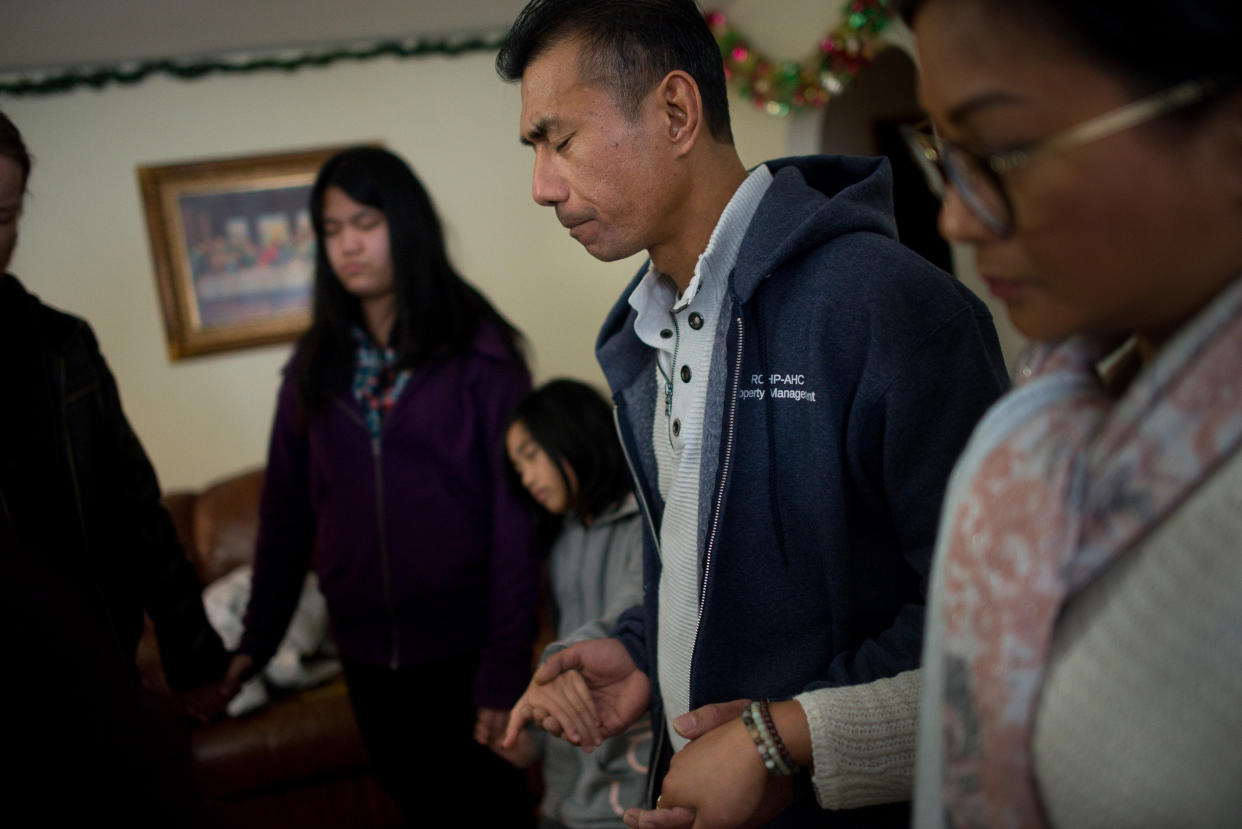
HIGHLAND PARK, N.J. — Harry Pangemanan is back home – at least for now.
After a federal judge in New Jersey halted his deportation last week, he left the church where he and two other Indonesian immigrant families had taken refuge, and went back to his modest rented house a few blocks away.
The first thing he did was check the shattered front lock, which vandals had broken before ransacking both bedrooms, probably after news reports that he, his wife and their two teenage children were all sleeping in converted classrooms at the Reformed Church of Highland Park. By now, days later, church volunteers had righted the upended furniture and put the clothing back in the drawers, but the new door frame had not arrived that would hold a new deadbolt.
Harry led his family and two church elders through the off-kilter doorway into his living room. Beneath a reproduction of “The Last Supper,” they all joined hands and said a prayer of blessing for the house and of thanksgiving that they had made their way back to it.
Then they prayed for others who were still in custody, or hiding in other churches around the country or living in fear that they could be detained at any moment.
People like Syed Ahmed Jamal, a Bangledesh-born molecular biologist, living in Kansas for 30 years, arrested by immigration officials this week as he prepared to take his three children, all of them American citizens, to school; or Carmela Apolonio Hernandez, a Mexican immigrant seeking sanctuary in an Episcopal church in Philadelphia since late last year, who last week defied an immigration order and sent her three undocumented children to their public school, outside the protective walls of the Church of the Advocate.
And people whose names don’t make the news. Around the country, 900,000 immigrants who had been granted deportation stays under previous administrations have seen those protections declared null and void by the Trump administration, which arrested 111,000 people in this category in 2017.
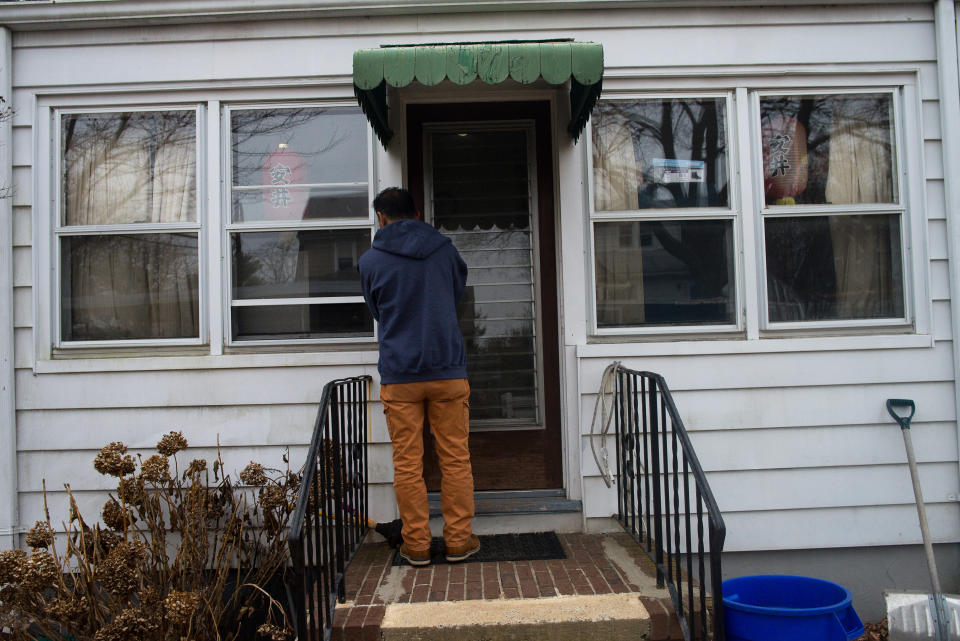
That is what Harry and other undocumented Indonesian Christians in central New Jersey are protected from for the moment — while a judge decides whether whether worsening violence against Christians like themselves in their predominantly Muslim homeland warrants a new amnesty hearing.
And so he waits. It is one more wait in an adult lifetime of waiting, of being at the mercy of bureaucrats and of shifting national priorities, of hiding while trying to build a life in America for his family. It is one more wait, too, for the Christian charity that came to his rescue in his darkest moments. It is one story out of hundreds of thousands, but it can stand for many.
*******
Like so many other stories of this millennium, this one began on Sept. 11, 2001. That was the day that Seth and Stephanie Kaper-Dale started work at the Reformed Church of Highland Park, N.J. They were both 25 years old back then, married since their junior year Hope College in Holland, Mich., and just out of the Princeton Theological Seminary with master’s degrees in divinity. The job was not their first choice; they had wanted to pastor in the inner city, and had applied to Hispanic and African-American churches in urban neighborhoods of New York and New Jersey. But those congregations took onelook at the blond, blue-eyed newbies and went in another direction. Which is how they landed in this relatively prosperous, largely Caucasian suburb, 1.8 square miles that was home to 15,000 people — only 60 of whom were members of this particular church, and only 35 of whom were healthy and mobile enough to actually make their way to Sunday services.

In fact, the church had been targeted for closing but the denominational elders decided to take a chance on the Kaper-Dales, in part because of the couple’s idealism and dynamism — but also because they came relatively cheap. “Seth-and-Steph” planned to split the job — sharing one salary and dividing their hours so that one of them could always be at home with their children.
They both came to work that first morning, though, walking into the office just as the first plane hit the World Trade Center. The new pastors made a sign announcing “Everyone Welcome” and hung it from the church’s red brick tower.
Many more than 35 people came to the candlelight vigil for victims of the attack later that week, including members of the cluster congregations renting space in the underused building. It was a motley crew – two Jewish minyans, a Buddhist prayer circle and a group of about 200 Indonesian Protestants who worshipped in the sanctuary from 4 to 6 every Sunday afternoon.
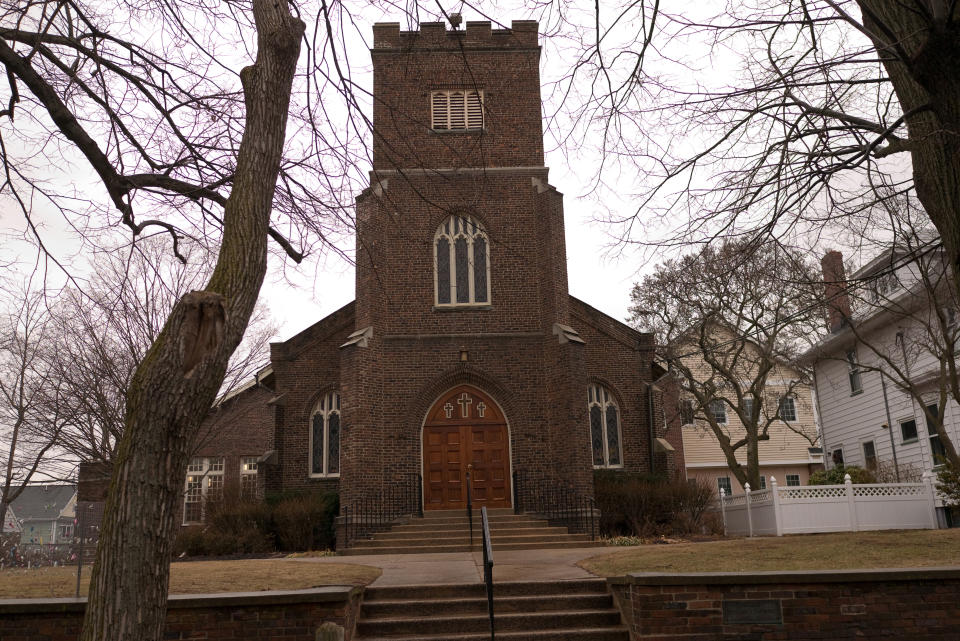
The relationship between the Kaper-Dales and the Indonesians was little more than this — landlord/tenant, plus an interfaith service on Thanksgiving and a yearly community potluck — until a year later, in the fall of 2002, when some of them began asking Pastor Seth for advice. As a part of its global war on terror, the Bush administration announced the National Security Entry-Exit Registration System, or NSEERS. A Muslim registry in everything but name, it required men between 16 and 65 who were from Muslim-majority countries to come forward and be fingerprinted, photographed and interviewed.
That was when Pastor Seth says he first realized that nearly all of the Indonesians who prayed in his church were undocumented. It was also the first he learned of the upheaval that led them to come to the U.S. decades earlier. How in 1998, President Suharto was forced to resign and Muslim militants intimidated ethnic Chinese Christians, rioting across the island nation, beheading church leaders on their pulpits, and burning down churches.
Fleeing their villages and unable to find work in the cities because their ID cards identified them as Christian, the would-be refugees thronged the U.S. Embassy in Jakarta. The Clinton administration took the fastest route to help them — issuing five-year tourist visas, with a wink and a nod. Back then, overstaying a visa was effectively a misdemeanor, and undocumented foreigners were in demand as workers. Many clustered in central New Jersey, working factory jobs and filling the squat, ramshackle apartment complexes that lined the numbered highways. In 1997, there was just one Indonesian Christian church in that area; by 2006, there would be nine, with a combined membership of 1,200.
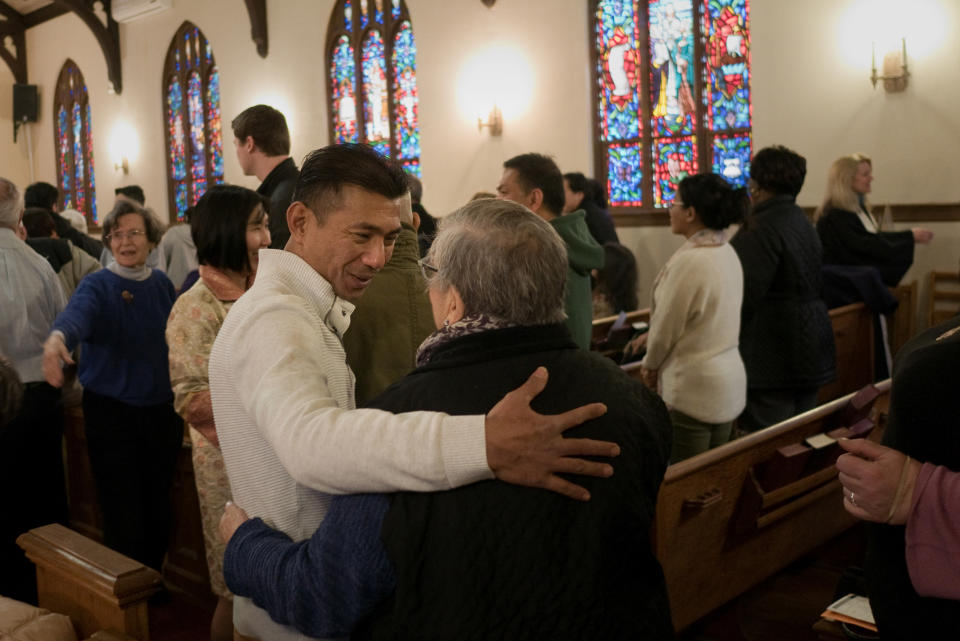
By the fall of 2002, new NSEERS regulations meant that those who failed to register would be declared criminal fugitives. They would be pursued by the newly formed U.S. Immigration and Customs Enforcement agency — the first Pastor Seth had heard of ICE.
It was Harry Pangemanan, a member of the Indonesian congregation that rented the sanctuary on Sunday afternoons, who suggested asking for advice from the American pastor.
Harry, now 47, had come to the U.S. in 1993 on a five-year tourist visa. Back in Indonesia, he had helped support his extended family cleaning oil drums during the day and selling gas by the side of the road at night. His first stop was California, where he lived with an aunt and uncle who published an Indonesian-language newspaper. He had a delivery route for the paper starting at 4 a.m., became the newsroom handyman and sent most of his money back home. Three years later, needing to send money to repair the roof of his family’s home in Indonesia, he took a truck-driving job, and settled in New Jersey, where he worked in a warehouse for a national chain, rising to assistant manager, met and married another Indonesian immigrant who had fled riots in Jakarta. And he overstayed his visa.
He says his original plan had been to return home when the five years had ended, but by that time the Suharto regime had fallen and the news he was hearing from his father was troubling. So the question he brought to Pastor Seth in 2002 was whether registering with ICE would put him and the other members of his church on a path toward citizenship or toward deportation.

Seth answered that he was not sure, but since not registering would effectively turn them into fugitives, it was better to comply with the law. In the end they not only registered, they did so with brio — arriving at their local ICE office at 970 Broad Street in Newark, N.J., at 2 a.m. on the day the registry opened, so they would be the first in line. Their intended message to authorities: they were Christians who were also victims of Muslim militants; they were in solidarity with Americans, not a threat.
“We trusted in the good will of the government,” Harry says now. “We trusted the government back then.”
As it would turn out, that decision to register “brought them under ICE’s umbrella,” says Seth, who describes those in the registry as “the most documented undocumented people on the planet.
“I would give different advice now,” Seth says.
At the same time, Harry and his cohort also applied for asylum on the grounds that returning home would put them in danger. Most say that’s when they learned they no longer qualified. A 1997 rule change required immigrants seeking asylum to submit their application within 12 months of arrival, something Harry and scores of other Indonesian Christians say they either were not told or did not understand.
But although they were never eligible for asylum, their rejections did not come quickly. Over the next few years their applications inched through the system. Because so many from the same community had applied at the same time, they were on the same check-in schedule, often car-pooling to yearly appointments together. It also meant that they were all finally rejected at the same time — in the spring of 2006.
Meanwhile, Pastors Seth and Stephanie were busy growing their own congregation toward its current membership of 300, including Harry Pangemanan and a handful of other Indonesian immigrants who joined, in part, out of gratitude to Pastor Seth. Seth was interested in learning more about these new parishioners — he and Harry would sometimes meet at Dunkin’ Donuts before dawn for Harry to talk about his life in Indonesia — but the focus of the Kaper-Dales’ ministry was housing, not immigration.

In early May of 2006, they had just completed an agreement to sell the air rights above the church’s office wing for one dollar to a new nonprofit, the Reformed Church of Highland Park-Affordable Housing Corporation, or RCHP-AHC, which was led by Pastor Seth. The mission of the new group was to build six apartments for young women who had aged out of foster care.
Still, “causes find you more than the other way around,” Seth says of the phone call that awakened him just before dawn on May 25, 2006. It was Harry, who was hiding beneath his bed with his pregnant wife and their 4-year-old daughter.
The Pangemanan family had awoken to sounds of shouting in the hallways of their apartment complex at One Woodbine Ave in Avenel, N.J., about 30 minutes from Highland Park. Looking out the window they saw handcuffed neighbors being loaded into ICE buses while children watched from balconies and sobbed. The officers did not have search warrants, evidently, but any undocumented man who answered the banging on his door was taken — 35 in all, most of them parents of young children. Harry did not let the officers in, but he was so frightened that he could not bring himself to leave his apartment and meet Seth in the courtyard when he arrived and reported that the vans had gone.
Rumors spread that ICE was planning another raid, and residents began asking Harry whether his pastor would let them stay at the Reformed Church — not exactly the kind of housing that the Kaper-Dales thought would be their calling. Seth assumed that if he asked permission from the church’s governing committee, or consistory, he would be turned down. So he decided on his own to let 10 families sleep in classrooms in the church’s school for two weeks.
Once he did inform the consistory, after the danger seemed to have passed and the families left, the members were concerned. The church was not zoned for residential use. It had no showers. There were fire-code issues. What was the potential liability for harboring fugitives? And what actually was RCHP’s stand on immigration?

Elizabeth Estes, who was a new member of the consistory at the time, has been writing the narrative nonfiction story of how undocumented immigrants and refugees revitalized this church and transformed its interfaith community. Describing that early consistory meeting, she quotes another member as saying: “I feel Seth’s action is unfair. So many people are waiting to come here legally. They are paying fees and following procedures. They don’t get to live here unless they receive prior approval. It just doesn’t seem right for us to help people who are skipping the line.”
Although her experience with immigration led Estes to get her master’s in divinity in 2017 from Union Theological Seminary, she writes that her own response was to be “alarmed” by potential legal complications, but mostly put off because “immigration was not on my agenda.”
Her causes were changing Sunday school so children remained in worship services and “beginning a working group to draft a statement about the church being open and affirming of people who identify as gay, lesbian, bisexual and transgender,” she wrote in her book, “Global Grace Cafe,” a draft of which she shared with Yahoo News.
“We hoped [the immigration issue] would just go away,” she adds today.
She says all this with regret for the arms-length attitude that prevailed back then.
“We didn’t even visit them,” she recalls of the 35 men who spent the next six weeks in the Middlesex County Jail before being deported. (Women were not taken mostly because they had not been required to register under NSEERS, and therefore were not yet in any official ICE database.) Nearly all of them were fathers of young children, most of those American-born citizens. “We just watched it happen,” she says.
“I backed off the subject [of the immigrants] because it was making people here nervous,” Seth adds. “Over the next couple of years, we’d periodically hear about people getting picked up but we didn’t do anything.”
In 2009, that all changed.
“It got personal,” Seth says. “When Harry was picked up, that’s when we flew into action.”
******
In the years after the 2006 raid, the Pangemanans were deeply involved in everything that happened at the Reformed Church of Highland Park. Harry’s younger daughter was baptized there, and attended the religious school. Harry’s wife was a leader of a group of Indonesian women who hosted fellowship and fundraising events. Like the Kaper-Dales, the Pangemanans also arranged their work lives so that they could share childcare. For them, it meant he worked the day shift at the warehouse and she worked all night.
For three years after the raid, Harry says, “It’s in our minds every minute that they will come for me sooner or later.” This was particularly hard on his children, he says, who, still living at the apartment complex that was raided, had friends all around them whose fathers were gone.
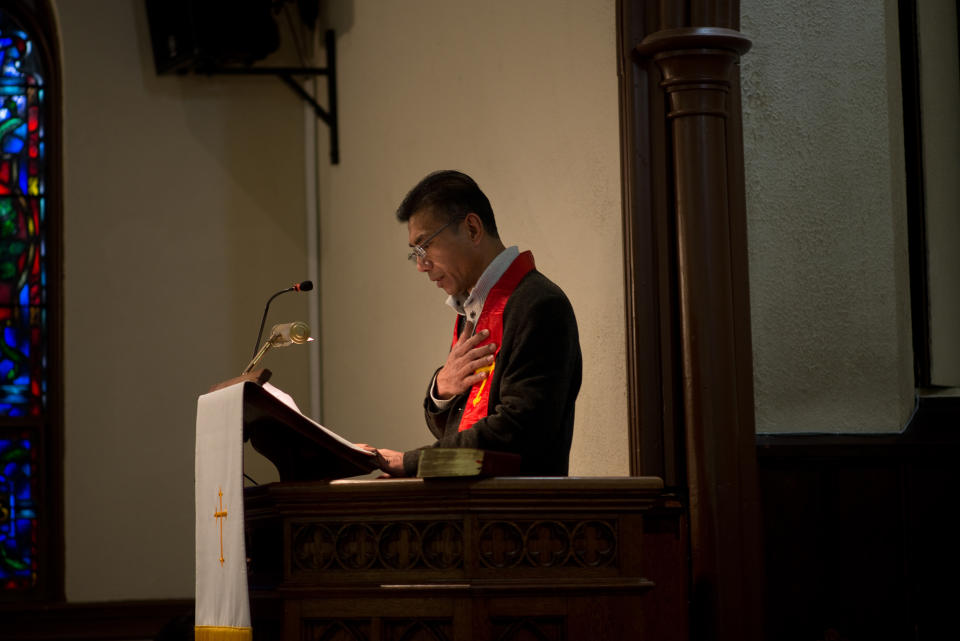
“My kids have to deal with the expectation every single day,” he says. “‘Is my papa OK? Is my mama OK? Will they be home when school is over?’” He was a bit more optimistic in 2008 with the election of Barack Obama, who had campaigned on immigration reform as one of his priorities, but only a bit.
And, as it turned out, the rise of the tea party and Republican control of the House after 2010 meant the Obama administration would never achieve the promised immigration reform. Instead, deportations reached the highest level in history. “History shows that whenever a chance comes for immigration reform, presidents up their deportations to show they are not soft, as a negotiating strategy,” Seth says. “If that was the strategy, it failed.”
But even before then, when the new administration was but a few weeks old, Harry, leaving for work on a winter morning, was met near his car by ICE agents, who took him into custody. From the pulpit the next Sunday, Seth cried openly as he updated the worshippers. Immediately after the service a team was formed to support Harry’s family: raising money to pay rent now that they had lost one salary; taking turns sleeping in the Pangemanan’s home to watch the children; finding and paying a lawyer; traveling almost weekly to Washington to seek help from lawmakers and bureaucrats; visiting Harry regularly in the Elizabeth Detention Center — the same place that had earlier housed the 35 detainees, who received no visits from the congregation.
“We would hope to say all the world matters,” Seth says. “But it’s a lie to think that you respond equally to everybody. When your family is under threat you respond differently, and Harry was family. People who had been concerned, but not necessarily motivated, were now doing daily visits.”
This went on for 53 days until the morning that Harry called his wife to say that he was being put on an airplane. Fearing Harry was being sent back to Jakarta, Seth grabbed his clerical collar and drove to the Newark airport, knowing only which airline Harry would be on.
There were no flights to Indonesia listed on the Continental departures board, but there was one to Seattle, and Seth knew from ICE press releases that the agency’s new policy was to fill rented 747s planes with deportees at the Seattle-Tacoma airport, then hop-scotch them across Asia, stopping in capital cities and dropping people off. There was one flight that day from Newark to Seattle, leaving soon.

Somehow Seth talked his way through the TSA security checkpoint without a ticket, telling officers that he had a congregant who was being deported and he need to pray with him before he left. The departure doors had closed by the time he got to the gate, but he talked his way onto the plane too, with the help of an Irish Catholic gate agent who saw him on his knees at the window, praying fervently, and assumed he was a priest. “Follow me, Father,” she said, and the plane door was opened from the inside.
As he came down the aisle to the last row where Harry was sitting between two armed immigration officers, one of the agents wondered aloud how this pastor had managed to appear. Harry remembers simply pointing one handcuffed hand heavenward in answer.
He was actually not being deported. He was being sent to the Tacoma detention center. Over the next three weeks, Seth called “every number I could find of anyone in the (newly elected) Obama administration who could help,” including one night when he left messages on all 40 numbers on the ICE website. Only one of those calls was returned, he says — the one to Dora Schriro, a newly appointed special adviser to Janet Napolitano, the new Secretary of Homeland Security who had tasked Schriro with a review of immigration detention procedures.
She listened to Seth’s account. Soon after, without warning, Harry was driven to the airport, right up to a waiting plane on the tarmac. Immigration officers handed him an envelope and left. Harry didn’t know where he was headed until he opened the packet and found a ticket to Newark and paperwork saying he had been granted a two-year “order of supervision,” during which time he could get a driver’s license and a work permit and could not be deported.
The “miracle” Pastor Seth was credited with performing led several dozen more Indonesians to join his church, which by now was filled with congregants from 44 different countries. In September, just after the start of the academic year in New Jersey, two Indonesian fathers were detained by ICE while dropping their children off at school, and Reformed Church parishioners — by now “hooked” on the cause of protecting immigrants, Estes says — sprung into action.

Perhaps because he knew the ropes by now, Seth’s meeting with the ICE field officer in Newark, Scott Webber, led to an agreement: Seth would encourage the nearly 100 men in central New Jersey with final deportation orders pending to come forward and Webber would grant them stays of removal like the one given to Harry. They would be under the supervision of the church, and, like Harry, they would be able to get documentation like driver’s licenses and work permits. There would be two-year limit on the order, by which time, Webber said, he hoped immigration reform would pass and make the stays unnecessary.
As a show of good faith, Webber released not only the two men who had been arrested outside the school, but also five other Indonesians in ICE custody at the time. Believing in their pastor, nearly 80 Indonesian men came forward in 2009 under the agreement.
Then immigration reform never happened, and ICE deportations nationwide increased to 1,000 a day. The two years passed, the local Indonesians’ orders of supervision expired, and in the fall of 2011 all those who had registered under the church’s program received a so-called cash and baggage letter with an order to report to the ICE offices in Newark on December 10. They were to bring a one-way ticket back to Indonesia, and no more than 35 pounds of luggage. They were being deported.
Without hesitation this time, Seth publicly urged the Indonesians to defy the orders. The men did attend their Dec. 10 ICE check-ins, accompanied by church members, but brought neither luggage or airline tickets. Most left with short term extensions of their stays — but nine, including Harry, were denied.
Unlike in 2002, by 2011 the consistory had already voted to become a sanctuary for as long as the immigrants needed a place to stay. They understood that it is technically legal for ICE to enter a house of worship (if a federal judge authorizes a warrant), but they counted on the government’s reluctance to take such a step.
“You lose the evangelical vote when you enter a church,” Seth says.
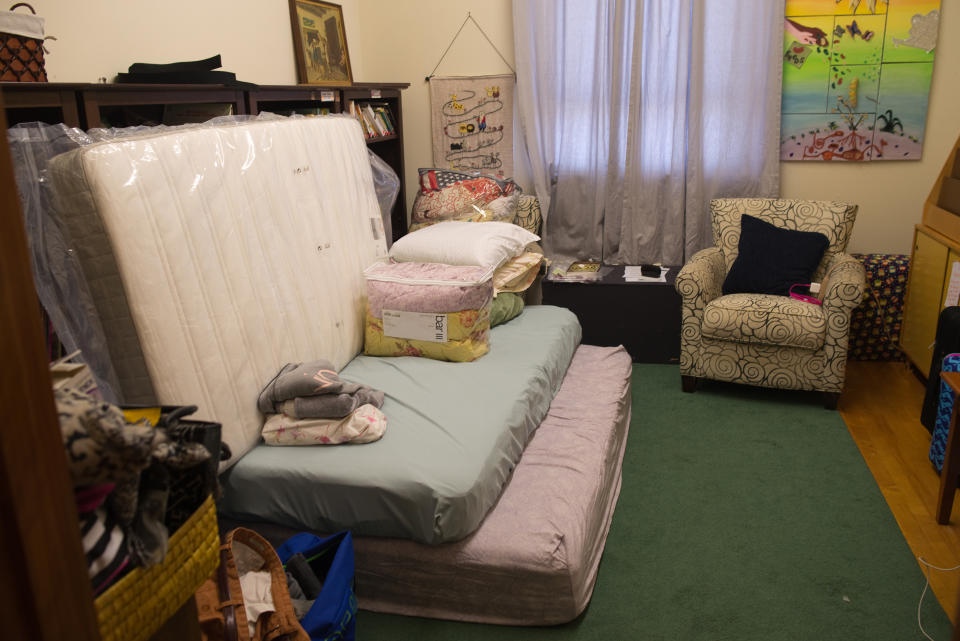
The nine sanctuary seekers spent 340 nights in the church. They slept on mattresses in religious school classrooms, which were propped up out of the way against the walls during the day. The local fire inspector waived the rules to permit it, provided one congregant stayed awake all night on fire watch.
For the first two months, those in residence created a makeshift bathtub using a garden hose and a kiddie pool in a downstairs public restroom. But when it became clear this would be a long stay, Harry worked with plumbers and carpenters to build a shower. During the summer months, a volleyball net was set up in the social hall.
Eventually, everyone but the Pangemanans would sneak home at night, pretending to still be in sanctuary mostly when reporters came by. This was not without consequences. One morning, the wife of one of the nine men lost her usual ride to her housecleaning job, so her husband drove her at 6 a.m. A few blocks away from their house, they were stopped by an ICE officer and the husband was taken into custody. He was soon released, however — an hour after a local reporter called ICE to ask about the arrest.
Then, in late October of 2012, Superstorm Sandy made landfall in New Jersey, about 20 miles south of the church. The nine who had been living there turned it into a different kind of sanctuary, setting up generators, filling the social hall with cots, collecting donated supplies, cooking Indonesian meals for neighbors without power. Eventually Harry began to leave the building too — driving vanloads of donated supplies down to the devastated towns of the Jersey shore, risking being detained again and deported.
Eventually this would become his full-time job. Using skills gained during all those months of keeping himself occupied at the church by doing repair work on the building’s heating, plumbing and electrical systems, he turned to rebuilding homes demolished by Sandy. Over the next few years, he would work on more than 200 of those, paid by grants and donations to the church for hurricane relief.
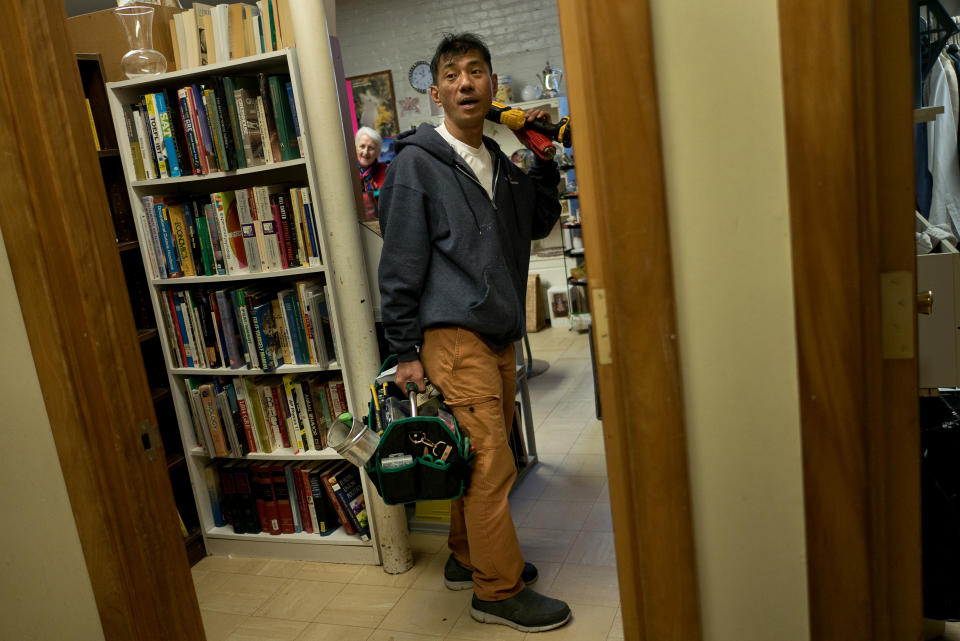
But first he had to get his freedom back. On Valentine’s Day, 2013, Seth, Estes and others were called to Washington to meet with the federal director of the DHS Enforcement and Removal Operations, Gary Mead, who offered a deal. All nine of the men in “hiding” would be given stays. This was not amnesty, not a path to citizenship, but rather an open-ended lifting of the threat of deportation.
The new stays were consistent with a memo written a year earlier, in 2011, by John Morton, the director of ICE. Known as the “Morton Memo on Prosecutorial Discretion,” it allowed ICE attorneys to take a list of mitigating factors into account when deciding whether to deport an undocumented immigrant, one of which was that the deportation of the noncitizen parent would harm American citizen children.
For the next five years, no Indonesians in the area were detained by ICE. The Reformed Church of Highland Park turned its attention to other immigrant groups, helping to relocate refugees from Syria, Congo and Pakistan. The congregation opened the Global Grace café in a large room outside the kitchen, staffed entirely by refugee chefs who create hearty meals from their homelands on a rotating menu. And the list of apartment buildings owned by the Affordable Housing Corporation, a subsidiary of the church, grew to 11. After his work on the Jersey shore was complete, Harry was hired full-time as the property manager of both the church building and of the corporation.
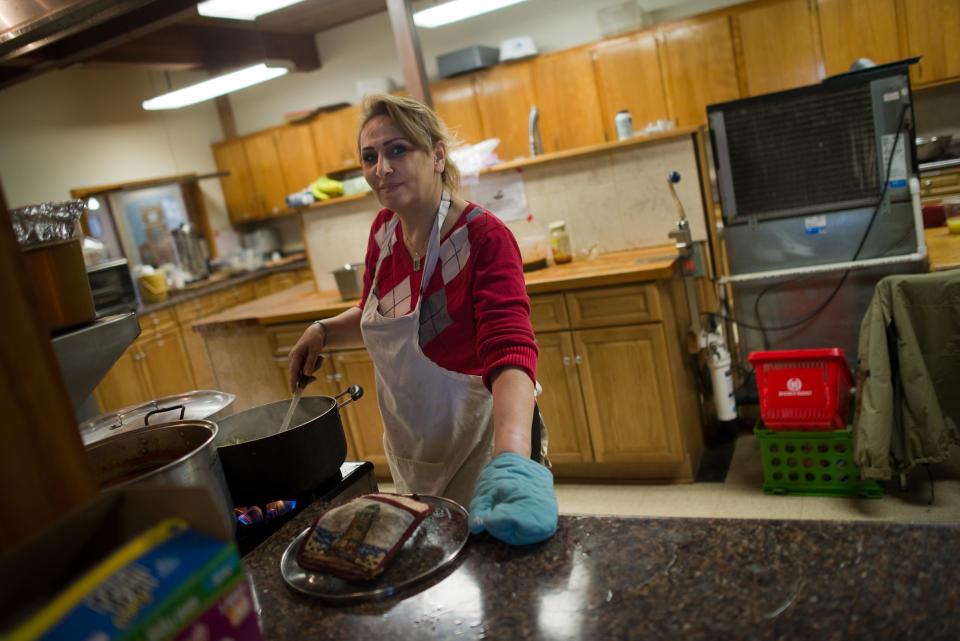
********
Pastor Seth says he knew the election of 2016 would change things for his undocumented parishioners. But he was surprised that things changed so quickly.
“This is a whole new world,” he says.
An executive order issued a week after the inauguration effectively nullified all deportation stays except those protected under DACA (on which the clock would not run down for another year.) It also meant that any undocumented immigrant caught by ICE could be deported — whether they were on a registry or not, whether they were the intended target of a raid or just happened to be present, and even if hey had previously been granted stays for extenuating circumstances.
Mostly using information provided by the immigrants themselves, ICE began detaining and deporting at a record pace.
While the total number of deportations was higher in the last year of the Obama administration than in the first year of the current administration, that is mostly because the Obama deportations were predominantly of new arrivals caught crossing the border from Mexico, and the number of such people dropped sharply this year. In contrast, a Human Rights Watch report released in December found that the number of people detained within the United States — people like Harry who had been here for a while and had an established paper trail — increased by 42 percent in 2017. At the same time, deportations of people with no criminal history other than their initial overstay of their visa tripled.
The man overseeing the enforcement of the new policies, ICE acting director Thomas Homan, rejected the idea that this stepped-up enforcement was either excessive or cruel. “The constant story about us separating families,” he told CNN last summer, “when someone enters this country illegally, or someone overstays their visa, they know they’re in this country illegally. If they take it upon themselves to have a child in this country and becomes a U.S. citizen by birth, he puts his family in that position, not ICE, not Border Patrol. [So] to vilify the men and women of ICE as separating families is unfair.”
At the Reformed Church of Highland Park, those statistics had names and faces. In January, a group of Indonesians who had been granted stays reported for their scheduled check-ins with ICE, and “no problem,” Seth says. “Then the first week in February, no problem.” But by the fourth week of that month, the four who kept their appointments were told to return in four months with their passports. When they did, they were detained and then deported. All four had been among the group that took sanctuary at the church in 2012.

Arthur Jemmy — who fled to the U.S. in 2000 after Muslim militants stormed a church service he was attending in his village of Poso, Indonesia, beheaded the preacher and then burned the church to the ground — was scheduled to report to ICE in September. But after the deportation of the others, Seth advised him not to go. His absence resulted in a letter requiring him to appear before ICE on Oct. 9, but on that date he and his wife moved into the church instead.
He was joined there on January 12 by Johanes Tasik, who did keep his scheduled appointment and was given an ankle monitor and told to return for deportation. He went to the church, called ICE and said he was seeking sanctuary. Since they knew where he was, he said, he would be removing the monitor.
And finally, on Jan. 24 of this year, Harry was about to drive his 15-year-old daughter to school when he noticed a black SUV with tinted windows idling nearby. He ran into his house, leaving his startled daughter in the car, then called her on her cellphone.
“Honey, you need to walk,” he told her. “But first could you turn off the engine and bring the key back into the house?”
His next call was to Seth, who immediately picked up Harry at his home and brought him to join Jemmy and Tasik at the church. Once there, they learned that two other Indonesian fathers had been taken into custody by ICE that morning while dropping their children off at school.
A week earlier, Harry had been honored by the Highland Park Human Relations Commission for the rebuilding work he did on the Jersey shore. Now he huddled with Seth and consulted with ACLU lawyers, who were drafting a class-action suit on behalf of the 43 remaining Indonesians in central New Jersey who had final orders of deportation issued against them by ICE.

The suit was filed at 3:50 p.m. last Friday night, 10 minutes before U.S. District Judge Esther Salas’s end of week deadline. To the surprise of counsel on both sides, Judge Salas scheduled a hearing that same evening, and immediately ordered a stay until she could issue a complete ruling on their claims that they had not had due process because their cases had never been heard by an amnesty judge, and that they deserved such a hearing because of worsening conditions for Christians in Indonesia.
The Pangemanans thought about moving back to their Highland Park house immediately after the decision, but their daughters were afraid of returning to where there had recently been a break-in. So the family eased into freedom gradually. On Saturday morning, they attended a hastily scheduled service to celebrate the judge’s ruling — then Harry left the building to get a much-needed haircut. On Sunday, they prayed with both their American and Indonesian congregations, then made the five-block trip to bless the house.
As it turned dark that first night back, Harry created a barricade, in lieu of the broken lock, and the entire family went to bed. In the morning, he would take his girls to school, then get to work replacing the entire front door.
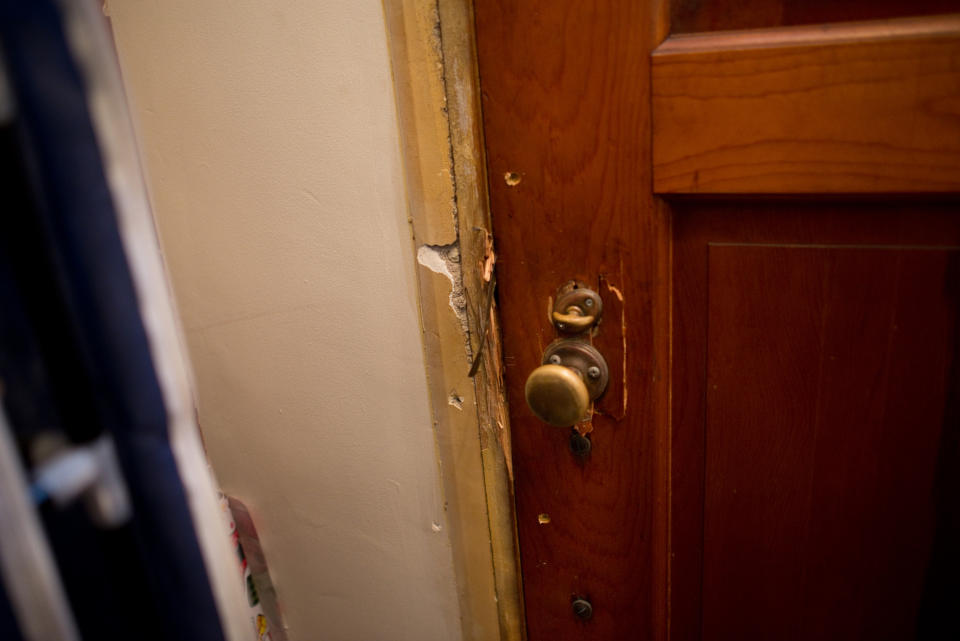
_____
Read more from Yahoo News:
Yahoo News’ Michael Isikoff describes crucial meeting cited in Nunes memo
The neo-Nazi has no clothes: In search of Matt Heimbach’s bogus ‘white ethnostate’
In wake of church shootings, pastors and worshipers arm themselves to shoot back
Photos: Syrian government airstrikes kill dozens in rebel-held Eastern Ghouta region


